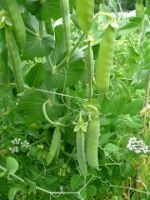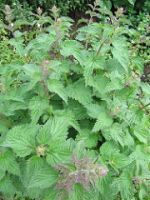How to Add Nitrogen in a Permaculture Garden

 Maintaining and enhancing nitrogen levels in your growing areas is one of the easiest elements to soil management and conservation. There are plenty of ways to add nitrogen for the use and benefit of leafy plants.
Maintaining and enhancing nitrogen levels in your growing areas is one of the easiest elements to soil management and conservation. There are plenty of ways to add nitrogen for the use and benefit of leafy plants.
One of the best ways to maintain and add to nitrogen levels in the soil is through incorporating 'nitrogen fixing' plants into your planting scheme. Legumes such as peas and beans, lupins, elaeagnus, and trees such as laburnum are some common 'nitrogen fixers'. These plants have beneficial interactions with bacteria in their roots and this enables them to gather nitrogen from the air and turn it into available nitrogen in the soil. Crop rotation and companion crops can both help to maintain the natural cycle, while no dig gardening practices can help ensure that the soil community is able to function as it should.
 For hungry edible crops in particular, your garden soil may benefit from an additional nitrogen boost in that area. Fortunately, it is easy to use mulches and home-made liquid feeds to add nitrogen. Mulches rich in nitrogen include grass clippings, and some livestock manures. Other green mulches can also provide the nutrition that leafy plants will need. Growing cover crops that are nitrogen fixing can help make the most of the space in your garden as well as protecting nutrients in the soil and adding additional nitrogen.
For hungry edible crops in particular, your garden soil may benefit from an additional nitrogen boost in that area. Fortunately, it is easy to use mulches and home-made liquid feeds to add nitrogen. Mulches rich in nitrogen include grass clippings, and some livestock manures. Other green mulches can also provide the nutrition that leafy plants will need. Growing cover crops that are nitrogen fixing can help make the most of the space in your garden as well as protecting nutrients in the soil and adding additional nitrogen.
 Liquid feeds are also a great solution to nutrition in an organic garden. Add nitrogen with nettle tea, or even diluted male urine. (Be wary of using diluted urine, however, from female members of the household, which can introduce hormones to the food system, or urine from these not living a healthy lifestyle.)
Liquid feeds are also a great solution to nutrition in an organic garden. Add nitrogen with nettle tea, or even diluted male urine. (Be wary of using diluted urine, however, from female members of the household, which can introduce hormones to the food system, or urine from these not living a healthy lifestyle.)
Taking things to the next level, the efficacy of nitrogen fixing plants will be improved when the soil is sufficient in calcium. They will also be at their most productive in soils with a pH of around 6.4. Having enough phosphorus in the soil will also speed up the process of improving nitrogen levels. In the future, higher nitrogen levels will then help to improve the rate at which phosphorus and other nutrients become available to plants.
Another thing to consider when there is a necessity to add more nitrogen to your soil is that nitrogen will be leached by woody mulches like wood chip/ bark as they decompose. No not mulch leafy crops such as brassicas with such mulches without taking into consideration the nitrogen cycle.